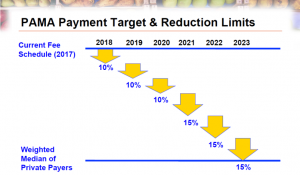PAMA
Another hot topic for all laboratorians continues to be the Protecting Access to Medicare Act of 2014 (PAMA) and its potential effects on laboratory reimbursements.


Dr. Brad Brimhall’s EWC session—Prepare for Coming Medicare Fee Cuts & Other Changes to Laboratory Payment Models by Focusing on Accurate Cost Accounting & Financial Analysis—outlined exactly how PAMA is expected to impact lab reimbursements from 2018 through 2023, and explained the new Medicare Access and CHIP Reauthorization Act of 2015 (MACRA) payment models. Dr. Brimhall stressed that laboratories should prepare for coming Medicare fee cuts and other changes to laboratory payment models by focusing on accurate cost accounting and financial analysis. Yet, he also referred to PAMA as a bit of a “head fake,” meaning PAMA is reducing lab reimbursements at a time when much bigger payment restructuring is taking place. PAMA is a bit of a distraction while we see how lab quality feeds into MACRA.
As an additional resource, Dr. Brimhall’s webinar, Prepare Your Lab for PAMA: Understand How Your Costs Compare to New Reimbursements, is available for download on Orchard Software’s website.
POCT Helps Bring Care to the Patient
The renewed focus on bringing care to the patient location shines a new light on the need to properly implement, manage, and integrate point-of-care testing (POCT). An EWC session given by Patricia Hines, MT(ASCP)BA, Community Physician Labs Administrator at University Hospitals Cleveland Medical Center, demonstrated how University Hospitals is using Orchard® Trellis™ to gain better control of POCT management and integration. By adding a POCT management and integration solution, it has reduced manual entry errors, improved quality, and increased its data mining capabilities.
As an additional resource, Orchard offers a webinar—Orchard Point-of-Care Testing: Benefits, Challenges, & Orchard’s Integration & Management Solution— that discusses how changes in the U.S. healthcare system are shaping the POCT market, describes POCT benefits and the challenges of POCT management and integration, and demonstrates the POCT integration and management solutions offered by Orchard.
Overall Message: Labs Need a Fresh Business Model
Robert Michel, Editor-in-Chief of Dark Daily, gave an EWC session that summarized the trends happening in healthcare:
- Continued provider consolidation and narrow networks
- Informed consumers and transparency
- Need for improvements in healthcare productivity
- Focus on population health management
- Growth and impact of precision medicine
- Increased value of analytics in healthcare
- Need for a new business model
- Need for adaptability and flexibility
- Expectation that everything will be measured, reported, and transparent
- High costs, poor quality, and poor patient services will not continue to be tolerated
credit: Orchard Software Blog




